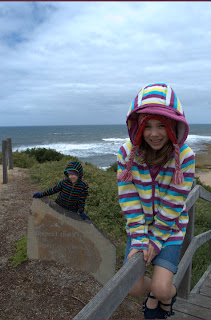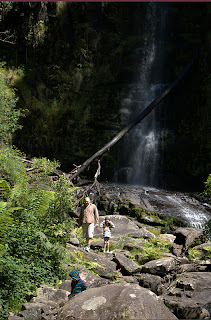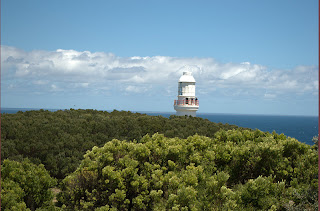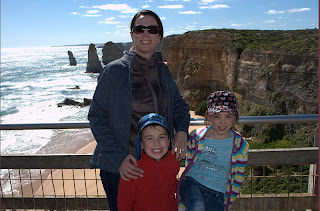 |
| The Twelve Apostles |
We headed down to VIC to see the kids Grandparents for Christmas and decided to explore The Great Ocean Road, renting a house in Lorne for 4 nights. On the way there we stayed at Geelong and went to carols on the bay which was lovely - 'the Bollards' amused the kids they are colourful characters painted onto timber wharf bollards on the bays foreshore. The weather was extremely cold for December so we promptly visited 'Katmandu' to purchase thermals, something I wasn't prepared for.
 |
| Hollander at Bells Beach |
 |
| Oren catching an aerial wave at Bell's |
 |
| 'Respect the Ocean - Spirit of Surfing' rock |
As we traveled south hugging the coast we stopped in at Torquay, Bells Beach, Aireys Inlet and its Split Rock Light House then on to Lorne. Lorne is a gorgeous little tourist town with trendy shops and restaurants and what looks like from its old buildings a flourishing history. From there we did day trips out to see Maits Rest, Cape Otway Light House (which featured in a recent Australian movie called 'South of Promontory'), The Twelve Apostles near Princetown and the Otway Fly Treetop Adventure which is highly recommended.
 |
| Split Rock Light House - Aireys Inlet |
 |
| The split rock |
 |
| Erskine Falls Lorne |
 |
| Looking at a wreck in the waves |
 |
| Maits Rest |
The history of the road and the light houses in the area is fascinating. Ships carrying migrants from Europe and North America first saw land at Cape Otway passing through the treacherous Bass Strait. The gap between King Island and Cape Otway was known as 'The Eye of the Needle' - sea captains of the time would stay as close to the coast as possible to avoid being wrecked on the Island in bad weather. Many ships were lost here in the early maritime history of the place which lead to the political lobbing for a light house to be erected there in 1848 to try and reduce the casualties.
 |
| The signal flags at Cape Otway |
 |
| Cape Otway Light House 1848 |
 |
| It was windy up the top of the light |
The light house at Cape Otway was manned first using whale oil, then kerosene to keep the light burning. Later changes included diesel generators, electricity, radio and global positioning satellites. Then in 1994, the introduction of satellite navigation systems caused the 'old light' to be turned off and replaced with a small solar powered beacon. The movie mentioned above gives some insight into the lonely life light house families must have endured to ensure the light never went out.
 |
| 'We Was Here' photo at the Apostles |
 |
| The limestone Apostles are diminishing slowly |
 |
| The path of the GOR |
The history of the Great Ocean Road is just as interesting, it is 243km long stretching between Torquay and Warrambool and was built by returning soldiers from WW1. Its construction started in 1919 and finished in 1932 providing employment for returned soldiers, and linking isolated settlements along the coast - the road becoming a vital transport route for timber and supplies which would normally have been transported by boat. It has become the worlds largest war memorial.
The holiday highlight was the Otway Fly Zip Line experience. The family was put into harnesses and helmets, given safety briefings and then zipped between tree 'cloud stations' in the eco adventure. Hollander and Oren challenged each other to see how long they could scream between each 'cloud station' - a bouncy platform at the top of a tree that you launch yourself from via a fly rope to the next about 20m above the ground. I think they've got to do abseiling next - mummy's 'Duke of Edinburgh Scheme' days are coming back.



























